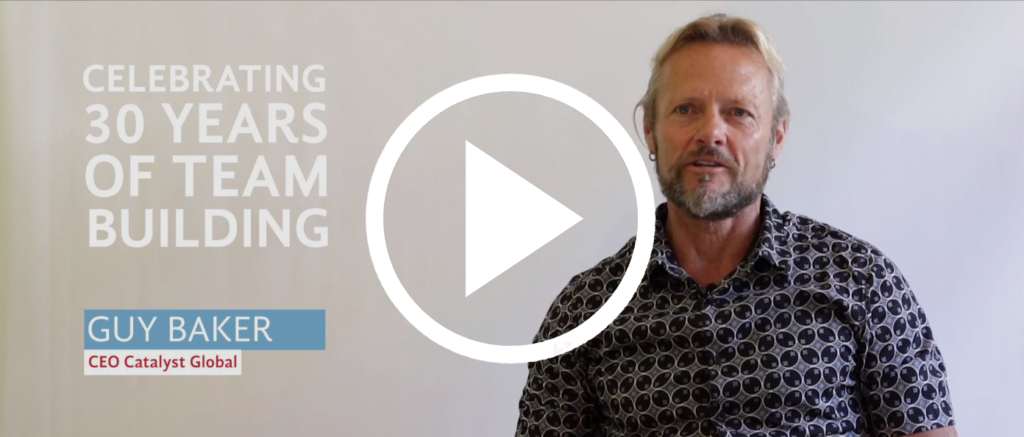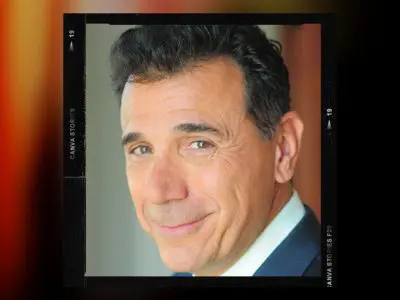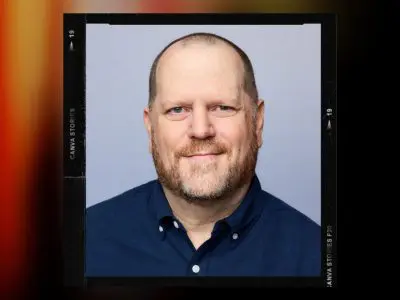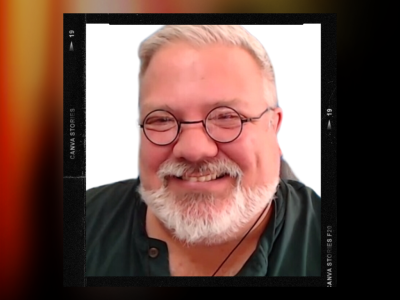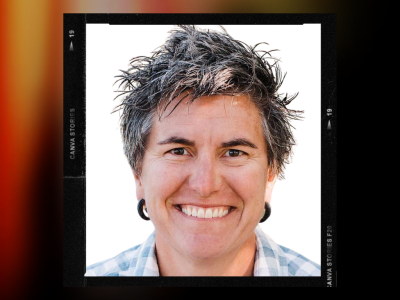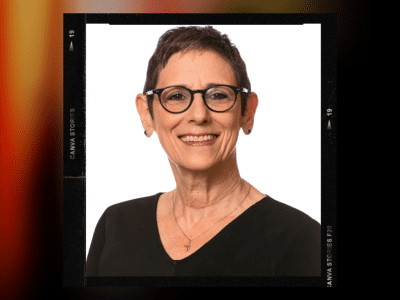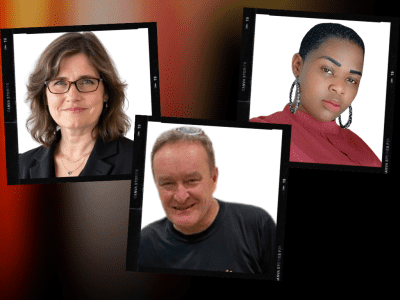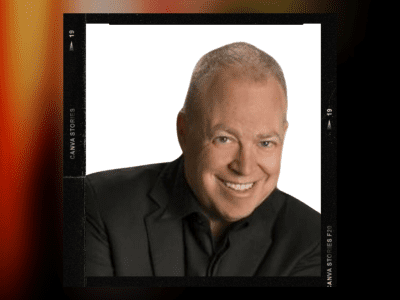Guy Baker’s Team Building Revolution
Listen to this inspirational podcast with host Guy Baker speaking on the start-up of Catalyst, its global success, the pivot to online activities, and the Team Building Revolution!
Use the buttons above to listen now.
Transcript - Guy Baker’s Team Building Revolution
Intro: The following is a presentation of TeamBonding, providing more than 100 Live, Virtual or hybrid corporate team building activities for companies around the world. Visit teambonding.com to schedule your event now.
Rich, your host: Hello team My name is Rininsland, and I’m welcoming you to Team Building Around the World, the podcast where I speak to people from the team bonding, team building industry, from all over the globe. Today, I am very excited to have with me Mr. Guy Baker, the CEO of Catalyst Global. You’ll hear the compelling story of how he built a team building empire. But before we get to guy, this show is supported by catalyst team building network. Find out more about the world’s largest network of team building providers at catalystglobal.com I’d also like to thank our friends at B1G1 which can make your business a real force for good. Visit B1G1.com to get started now, team in the early 1980s catalyst global CEO, Guy Baker started a small team building company in the UK. At the time, corporate team building exercises were tired, hackneyed events, seemingly all from a limited imagination of a small cadre of alpha males. Guy’s team broke every mold imaginable, creating dynamic activities that were inclusive, creative, sometimes even wacky. Now, Mr. Baker’s team building, community sports, 50 partners in 90 countries, and welcome to team building around the world. Mr. Guy Baker, everybody say hello to him.
Rich, your host: That’s actually just a small group of supporters happily hiding under my desk. Guy, that’s all they were. So thank you. Thank you very much for coming and joining us on the show here. Guy, and I’m very excited to have you. Can you tell everybody like not only who you are, but where you are? Right now?
Guy Baker: Right now I’m sat in a beautiful cabin which serves as our office down here in New Zealand, town called Nelson, which is on the South Island. I moved here about three or four years ago. Prior to that, I was living in Australia, and hopefully you can detect enough of my English accent left behind to prove that I’m what they call here, a POM or somebody who originally came from the UK. Excellent. So yeah, and it was, it was nice to hear you sum up. It’s always, you know, when you hear someone’s life been summarized in two minutes, there you go. Wow, did I really achieve all that. I keep pinching myself. It’s, it’s been a, it’s been a journey that’s flashed by, as you say, sort of like to create one thing there. I think I’d like to say it was the mid 80s to late 80s. Otherwise, I think I’d be getting on a bit, yeah, I was, I was in the I was in the college in London in the in the early 80s. I did, I did communications. So my background has always been in in how people communicate one way or another. So that’s how it all started. So
Rich, your host: what actually made you decide to like that you were going to completely redesign team bonding and team building in your own way.
Guy Baker: Yeah. Well, it was interesting. I was in London. I actually stayed in London for 10 years, doing a post grad and living London. And I actually saw a film, I think it was called Roxanne, American movies. Steve Martin, yes, yeah. I think he’s got a really big nose. In that movie, he does. He’s a fireman with a big nose, and I just saw him living in this lovely place. That’s funny now, because I’m now I’m living in that lovely place, but at that time, was living in London, thinking like, why am I doing this job in London, when I could be doing something similar in a nicer place? So my first thing was to get out of London and I moved north to Cumbria, which is in the north of England, on the borders with Scotland, sure. And Cumbria was, Cumbria was really the sort of the birthplace of traditional English team building using Army Command tasks. That’s the birthplace of, for example, Outward Bound. Outward Bound, the company Outward Bound was actually, that’s where that they started. They went into, you know, they were around the world now, and so I moved up there. And when I started, I was something called, now get out of that, which was a very short series, TV series, one of the first reality shows, actually, because people were put into tricky situations, which as a team of people, they had to work their way out of. So with my background in communications, I was observing people acting as teams, and I was thinking, wow, this is pretty interesting. You’re putting people into a short space of time where a lot can happen, as long as Lord of the Flies, you know, six boys on an island. What’s going to happen if you put five, six people together in the team, give them a problem to solve, a lot’s going to happen in that time. So I guess it was from, you know, a couple of years of observation. That’s where that comment about the alpha male is correct, because what was happening consistently in those teams was the alpha male would sort of dominate. It would sort of. Rule of roost, and his opinion would be and but I was watching teams over a period of years, and I was seeing that wasn’t the success route. The teams that were successful were teams which gave everyone voice, people who prepared to listen. You know, now on this day of COVID, COVID 19, with all these zoom meetings, and that’s gone full circle. I think the power of listening is one of the most important attributes that people perhaps have.
Rich, your host: Wow. So what does that look like guy?
Guy Baker: I mean, I think I can do this better, and I’m going to break two rules here. One, I’m going to take people away from having to come to the Lake District in Cumbria. So it wasn’t going to be location specific. I was going to take the challenges to conference hotels. They seem hard to believe, but in the in the mid 80s, that was actually the start of hotels developing space or conferences. I mean, in the 70s, people went and stayed in hotels for work or for pleasure. They weren’t actually the conference industry isn’t that old, I mean, but that’s the those of us that have got older have actually grown up with the growth of the conference industry. And it was a conference industry and meetings and planning industry that we we plugged into. So we were able to go anywhere in the UK and deliver events make people feel that they were in the great outdoors of Cumbria, but they weren’t. They were actually in the gardens and grounds of the conference hotel.
Rich, your host: Very nice. Now let’s talk a little bit more about the changing the actual pattern of way that team building events go. You must, I mean, you must have faced some rather strict resistance to to that kind of change. How do you go about turning that from this is the way it’s always been to you have the better way, and they should just listen to you.
Guy Baker: Beautiful question. I always think there’s no such thing as luck. I think you make the most of the opportunities as they’re presented to you well put. And if you’re, if you’re prepared to see them, and you prepare to think creatively and in the innocentively, you can actually create your own luck. Call it luck, but it’s not so. While we were doing these outdoor based conference sort of activities, my background and my actual interest was still in, you know, art and music. I was still going out to clubs. It was sort of, you know, playing Congas in bands and genbay and all these sorts of things as a sort of late, late 20s, mid 20s guy, nice, and I really wanted to bring that into the corporate world, but the corporate world wasn’t doing that at the time. This seems amazing, but nobody was doing drumming back then in the in the even the early 90s. And so we were really lucky. You probably heard of a company called Microsoft. I’m aware of them, yeah, well, back then, this is my point. People hadn’t Microsoft were in the UK, late 80s, early 90s. I think I knew all the staff by name. There were 26 people, you know, the following year there was 100 following year there was 300 and so on. So Microsoft grew exponentially, and we, as a major supplier to Microsoft, were doing their team building events. We were doing their sort of family fun days. We were doing their Christmas parties. We’re doing a whole bunch of stuff with Microsoft. We’ve got a very well good relationship with the HR department there. And we and they bankrolled my crazy ideas every time I said, Okay, right. We’re going to create the world’s largest Samba band. We’re going to do it on a stage in Ireland. We’re going to use Irish dancers. Michael Jackson happened to be playing on the stage today that two days later, Michael Jackson was playing. He needed to set up, but we booked that arena, so we said, okay, you can set up earlier, if we can use your stage. Crazy Things were happening, awesome and and it was back in those days, I guess I won’t say money was no no object, but it was certainly a lot more free flowing. So each year, Microsoft would say, Okay, what have you got for us next? What have you got for us next? And then other companies, like British Airways started jumping on and they were flying our staff all around the world just to deliver a beats work event. Because, you know, through British Airways, they heard that it was a great way to finish a conference so high energy. And soon, I would say, there was a period in the mid 90s, where we didn’t have to sell anything, all we did was pick up the phone. Really, it was easy as that, because we were streets ahead of everybody else. We were doing the huge works of art or beats work. I mean, the story behind that is, I do a lot of adventure sports and ranging from kayaking through the mountain climbing to paragliding. And I actually broke my knee on a cliff paragliding in Wales, and so I was had my leg in a cast for, I guess it was a couple of months, and I wanted to paint a work of art. I’m good mixing paint, but I. Not so good with the actual draftsmanship of it. So we projected this Picasso onto a canvas and drew the Picasso that I was then going that break from the outdoors conference venue to then started looking at creativity. And to answer your question, you know, being so closely connected to Microsoft in those early days. They sort of bankrolled, you know, our new development in team, team building.
Rich, your host: let me ask you, real quick, just going back to those early days, how many of you were even there, and what were you called?
Guy Baker: We’ve always been called Catalyst. Okay, we started off as catalyst event management, and with event management, that’s why we’re doing their Christmas parties and their fun days and so on. But then I realized that there were agencies out there who saw us challenging what they were doing, and we wanted those agencies to sell us, and they would only sell us if we could go under their umbrella, so they would promote themselves. And we pretty much had to stop saying, Okay, we’ll organize the trains, the transport, the buffet, etc. And so we honed in on what we did best, which was team building and team done at team dynamics. And, you know, we all became the question how many of us were? I mean, we started off with just myself and the original partner across the kitchen table, called Martin Ruby, and there was just two of us, and it was literally two people. One thing I did do, I spoke to my partner about this. The day is early on, we had a chairman. And I think for anybody running a business, this is a really good thing to do, somebody who sits outside the business, who’s not on the board of directors, who’s trusted by all the directors, somebody who can actually hover above the company, maybe they’ve got connections or not, but I think the board listens to Chairman. I think if a company I’m going off track here a little bit, but if a company grows just within itself without somebody outside actually managing the dynamics of directorship. I think one of the reasons we were successful is because we actually had two very strong chairmans over the process of the company was in the UK.
Rich, your host: Very nice. Thanks, guy. Now bear with me for one quick second. I want to take a break to tell you my listeners about the Catalyst team building Network, an association of team building providers with representatives in over 90 countries speaking more than 20 languages, the catalyst network is widely regarded as the voice of the team building industry. Network members share resources, best practices and business opportunities. Catalyst partners are learning from each other and pushing the boundaries of what is possible in team building catalyst network members share a common goal of creating highly relevant, socially responsible and good, valued experiences for their clients. For more information, please visit catalystglobal.com
Rich, your host: you want to talk a little bit more with the time we have about now what’s happening with you guys today. First of how many, as I was just saying, you’re, you’re in over what, 90 countries?
Guy Baker: Well, we’re in 90 countries because certain partners have two territories. So, okay, three. So some of the African partners might have a license in different characters. Me, technically we have 5052 I think it is licensed partners. We, in the early days, decided not to run it as a franchise, by which I mean the partner doesn’t have to call themselves catalyst. So the catalyst brand in America is not actually represented, represented by team bonding and play with a purpose. So we have two partners in the States. You know, obviously we’re in Canada, rule through Africa, Middle East, nearly every country in Europe. And then it might surprise you, but the more profitable and South South America as well, and down through Mexico, Central America, Pacific zone. So New Zealand, through Australia, up through Indonesia, into Malaysia, Hong Kong, China, Shanghai, Beijing, you know, India, Pakistan. Now, I miss somebody there, but Japan, so they what’s that’s given me. It’s given me is getting a really interesting outlook on team building across the globe. And I think that’s the last 10 years we’ve been building the global network, right? So we see we became the biggest team building company in the UK, and then I personally left the UK organization and moved into the global network, to actually develop the globe global partnerships, and to grow new business through global associations.
Rich, your host: And what kind of benefits have you seen from that change, from that growth
Guy Baker: that goes two ways, because what that’s given us, it’s given us access to some other cleverest mind. In team building around the world. So one of our best and best selling products right now called the infinite loop, which started off as where you put on the BR glasses, and it’s virtual reality simulation. Sure, you do a bunch of stuff, your other team members are outside the goggles, and then you’re inside. That in the last two months has had to be transferred into, you know, an online activity. They can be played remotely by people, six people in different places from anywhere in the world. But in your case, it probably six people sat in the States, and they’d be playing that activity in the same way. They will be playing it as if they were at a conference around the table, and we’ve had to do that very quickly with several of our events. We’ve had to be very adaptive and agile to change what were face to face team building products into activities that could be delivered remotely.
Rich, your host: Fantastic. Guy. Now tell me, how do you handle things like, I mean, keeping, keeping the team of the network going, even though you’re talking about very different social situations, even taboos?
Guy Baker: yeah. Um, so one of the things was pre COVID and post COVID. We had biannual meetings. So our last amazing meeting was in South Africa, where everybody came together. We took over a safari park in South Africa, there was 110 people from all around the world speaking all different languages, all with one thing in common, is that they were masters of team building and running the team building industry in their in their territory. So we we, because we’ve become successful, we get to pick the cream of the crop. We might have had five people approach us from Israel, for example. And we do our due diligence on those companies, and we find out which is the best one to represent us. And we meet up with them. We spend several days, getting a mix requires and as I said to the guys in the states, if you can’t sit down and have a beer with me, I’m probably not the right person to be not I’m saying, I’m not saying I’m gonna drink 10 beers. Sure, sure. I’d love to have a beer with somebody, and I like to, and I like to have a social engagement with them, so that these people around the world, these 50 partners, have all become amazing friends. I’m one of the luckiest people in the world. That I bought an extended friendship network throughout the planet. And pre COVID, I would travel around the world. So last year, I went to Mexico. This year I was all set to go to Chile and Pakistan, and visit partners. And face to face, I visit, I visited nearly all our partners in situ. So that includes places like Kazakhstan and Lithuania and Estonia and countries you’ve probably never even heard of, and then and then. So every year we had a meeting. Last two years ago at this amazing meeting in Africa, in the safari park this year, we’re all set to go to an amazing hotel outside Dublin. All the partners will come together in the interim years, the odd number years, we have zone meetings. So we divided the world up into three zones. We’ve got the Americas running Canada down to Chile, and then we got the Eurozone includes Africa and the Middle East, because Dubai is a huge, huge player, and they sort of feed into the euro. And then we have the Pacific Asia zone that I mentioned, and they have separate meetings. Currently we’re running zoom meetings weekly or the eurozone and sort of monthly for the Asia zone. And so we, because they have similar issues that they want to deal and tour with. It’s become a so saying in a strange sense, but it’s almost like a it’s almost like a cooperative where people and when people join, they can’t quite get their head around it. Why would I do this? Or somebody else in the world that I’ve not actually met? That’s why it’s so important that we have these annual, biannual meetings, and I don’t get a return. What’s my return for it? Well, the return is that when you’re in need of something, somebody else will come around and help you. So we have a chat forum that’s like, you know, I woke up this morning, there’s 6060, items have been entered in there overnight where people have said, we’re doing this. And, of course, everything right now is based around, we’re doing this on Zoom. You know, which platform can we do this? How can we have breakout rooms? Who’s done this with this? And they’re, and it’s, and that’s where they help themselves, and they actually, literally answer each other’s questions. So it’s always saying to some of the other directors, to some extent, our job is got easier. In one respect, we’ve built up such a knowledge base, and obviously it’s got harder, because we’re always having to move forward and next thing, right?
Rich, your host: I love the fact that you’re asking your own questions now. I can just sit here and listen to. You talk for like, 20 minutes, but I do want to take a brief second just to talk to my team out there about b1g1 which can make your business a real force for good. When you’re part of b1g1 you bring new purpose, meaning and relevance to your business by making giving a core of what you do. Unlike conventional giving models. B1, g1, helps small and medium sized businesses achieve more social impact by embedding giving activities in their everyday business operations to create unique giving stories. Every business transaction can impact lives from as little as just one cent. So please visit b1, G, one.com to get started, that’s b1, g1, business for good. Now, guy, I want to focus a little bit, if we can just on you, um, what, for example, right now, what’s one of your favorite events that your company offers?
Guy Baker: I thought you might ask that my my background, if I take you back to that, that comment about being an adventurous so I was in my sort of late 20s and 30s. I explored the world with a kayak. I never made it a professional. I did a lot of video work, like because I did communications and things at college, I’ve done a lot of filming stuff that ended up on that National Geographic. Nice. I was filming. I was filming at that sort of level, and I was also kayaking at that sort of level.
Rich, your host: So you’ve had a boring life, is what you’re saying.
Guy Baker: Nepal, I’ve been to Nepal more than 25 times. I keep kit in Nepal, in Kathmandu, I was been to South America, explored the rivers all through the Andes and so on. And I was doing it that time when it was just a joy to travel. You know, we didn’t have these long lines at airports. We’d rock up with a kayak. Everybody would wonder, what, who the hell we are and what we were doing. We get into countries. People just amazed. They hadn’t seen kayaks. You know, when you’re doing first descent of rivers in the Himalayas, people, just local people haven’t even seen a kayak before. Yeah. So I created on the background of that all my friends were getting into professional river running, and rafting companies were coming up. We did a great activity called River runner, where each team is a rafting company who are about to run down a river for the first time, and they how many safety kayakers do they take? What’s their budget? It’s a complicated game. There’s 10. You need eight people to play the activity because there’s there’s eight sets of information that each person becomes a specialist in something like the winner, forecast or communications with the radio, planning their route down the river, where they get on, where they get off, how they deal with a hippo attack, all these things that I experienced on I have I was attacked by hippo on the white now in Uganda.
Rich, your host: And when are you gonna write your book?
Guy Baker: a few people have said that. I guess it’s not I’m hoping it’s not over yet. So, good, good. Probably another half dozen years left, I’ll be working.
Rich, your host: I’ll go start it for you. We’ll just talk a lot more.
Guy Baker: Yeah, so river runner, because of my experience in running rivers, would be a favorite. After running rivers, I started paragliding and then climbing mountains. So I’ve climbed several Himalayan peaks with all the ice axes and crown ponds, and they’re coming mountains. You see another team dynamic. You see the whole Everest thing where people are paying and so on. Yeah. So we then created a really, really nice game that’s actually an app called peak performance. So in this one, you climb a mountain in a room. The mountains are the front of the room. You can see it on a screen, and you can see where the other teams are. They have to go through the ice fall. They have to make numerous decisions. They get movement choices. They get to choose how many guides they take, how much oxygen they need. They need to understand the effects of altitude, predict the weather patterns so they can work their way when’s the best time to make a cent right on the peak nobody dies in this game. People sort of, they get they get heavy, they get helicoptered off, rescued. But, you know, there’s a cost to that, as you can imagine. And you know, so you got things like peak performance. You’ve got river runner, the fact that I was the first person to bring the big picture straight down after my own paragliding accident when I was younger and interesting going into, you know, to clubs and nightclubs. I love that whole music scene. That’s when I came along with the idea of, you know, beats work, which is our Samba event. That’s actually a story in itself. So we were doing an event for Microsoft, and I think they’d reached numbers without 600 in the UK and loads of money. And they said, Oh, can you do that? So the problem we got at the moment is sales marketing and sort of head to head against each other, sort of, you know, the sales people are doing one way marketing to another. And of course. Bunch of directors that that are sort of hovering above all this. We need to do an activity that’s going to replicate a company in some way, and actually highlight the differences and yet bring them together, right? I was thinking, actually, I can remember thinking American football, gridiron. I was thinking like, yeah, that’s, that’s, that’s, you know, you’ve got specialists that cut certain positions and do certain things. I think I can’t have Microsoft people playing American football. That’s not going to happen. What else is, what else is, what else is a big team with differences in it that’s coordinated by somebody. So that’s why I had the idea of an orchestra. And I thought, I know we could do an orchestra. I convinced Microsoft that we would book The World Albert Hall, which is the biggest venue in the Union London. Amazing building. Yes, I said, Look, book the Albert Hall, and we’ll put an orchestra down the front, and then you, your people will be in that orchestra. And when they’ve got to present, they’ll stand up from within the cellos, and the guy from the marketing will be in the cellos. There you go, wow. We didn’t know he was there. And then he would do his piece, and screen would be behind, and he’d sit that down. The orchestra would play head more, and then somebody stand up from, you know, the horn section, and they were in sales anyway. At that point, it was when Microsoft restructured and wanted to move a lot more emphasis to being based in Ireland. Okay, Dublin. I think there were some good tax reasons doing that by all accounts. Yep. So then and they said, guys, we’re moving. We’re not having the conference in line. We’re gonna do it in Dublin, but we want to do the same thing. I said, still gonna work in Dublin. We don’t have the, don’t have the Robert Hall, right? And I can’t get the orchestra in the same way. I can’t so I was thinking, Okay, what’s like an orchestra now? And it’s not an American football team. And I was driving down the motorway, I can remember exactly where I was on the m6 and I saw a sign that’s turned off. And I was thinking, like, that’s interesting, because that science I’m not turning off. Where that sign is, that sign is telling me that the turnoff is coming up. This was going through my mind. And on the on the radio, there was some samba music, and I was listening to this samba music, and I could hear this whistle. And the whistle was controlling the instruments in controlling these people who were probably walking most of the time when they were playing, sure, and I thought the whistle is like the sign on the motorway. I don’t do my thing when the whistle blows, the whistle blows, and it says, In a count of four, we’re going to change. And in the motorway, I change when the line comes, when the deviation comes up, not on the side. This whole thing was all coming together in my head. And I went samba music. That’s it. I’m going to do samba music instead. So I went to see the London School of samba, head of and he I said, How long does it teach you take Samba, teach take to teach Samba. And he said, about two years. Okay, I don’t want to talk to you. I’ll go to Liverpool. I went to Liverpool, head of samba. And how long does it take to learn Samba? Same answer, two years. Same answer from Manchester two years and I went to a party, and there was a drummer at the party, and in the break, I talked to the drummer who haven’t worked with special needs kids and through his school system, and I said to him, could you teach anybody to play Samba? How long would it take? He said, I could teach you samba in about two hours. Said, right, you’re the man I need, but I need the credibility of the other three. Right? I had a meeting with the head of the London, Manchester and Liverpool schools of samba, who were actually at loggerheads because they competed against each other. London was better than Manchester was better than got them all three together in the same room. I got this, what they call a peripatetic music teacher in the room with them, and I said, Okay, we are going to teach a bunch of people have never touched a samba instrument to play Samba in two hours. And they were saying it’s not possible. I said, Yes, it is. Listen to him. He just told me it is. And so we have first thing I said, they were being totally purist about it. They were saying, like, you know, pure Samba. Okay, you probably can’t be, but you can get close to it. So then we’d look at the eight instruments that made up a samba band. We broke those down. We worked out how you could clap out all the things. First he would have touched instruments those 20 minutes. And we had a whole process. And then that’s how that led to us doing samba music on the Michael Jackson stage in Ireland in whatever year it was. A map from then on, was that massive period where we didn’t have to sell anything, because it was just the best, and it still is. I mean, it’s incredible when, because now what you get, you get 30 people working together that come together, come together, come together. So you end up with any multiples of 30. So it could be 300 or 600 or 1000 people, and they all come back together, and they play as one big unit.
Rich, your host: very nice. So let me ask you, though, especially being as big as you are in the adventuring and I know it’s probably been a while since you’ve been in front of a group yourself, what? What does a man like you go in for, for, say, like an icebreaker or an energizer?
Guy Baker: Well, the funny thing is, right now. We’ve been having to do them on Zoom meetings. I did an icebreaker the other day. It’s actually, it works really well. It’s quite a visual, obviously, because you’re on a Zoom meeting. So I’ll explain it to you, but for the listeners, whether they’ll actually grasp it, but right if you, if you take your hand and make the okay sign and hold it out in front of you, so there’s a ring, and if you look through that ring, and then my nose, as you’re looking at me, is in the middle of that ring, you then cover up your left eye, and about 75% of people will still be able to see me through that ring, through the ring, because they’ll be looking through my right their right eye through the ring at me, right? That’s because their right eye dominant, right? Because their left eye, their left brain, is concerning the right eye, and the right eye dominant, as it is an indication that they’re sort of reasonably methodical, more analytical. And if, if the ones that don’t see me are the ones are left eye dominant, because you’ll try it later on. The ones that don’t see me a left eye dominant, they’re controlled by the right hand side of the brain, and they’re the creative ones. And so that little icebreaker is actually intriguing, because people learn something about each other. It’s very odd that you can’t see suddenly, when you just cover up one eye and looking through a ring, you’re only at arm’s length away. So you’re, you know, you’re about to two feet from your from your own eye, and that’s the difference between the eyes. So that as an icebreaker, I like that, because it’s and you can develop that. So you can say, Okay, what does left brain, right brain mean? You can play around with that. You can make that quite fun on the Zoom meetings. Of course, you can get people to stand up, okay, who was left left eye dominant. Okay, look, we can see who the creative people are amongst us.
Rich, your host: So a lot of you got a lot of nice science going on behind all these things.
Guy Baker: I like the science. I did a lot of work with neuro linguistic programming, or NLP, started in California, I believe, back in the 70s. And most of my staff when I was in the UK, I would pay for them to go on an NLP course, because I believed it was a really good way of getting empathy. And when it’s used maliciously by salespeople to sell us stuff we don’t want, when it’s used with integrity, it’s actually a very interesting way of improving communication skills. So, so, for example, people have different preferred representation systems. So I’m a I see what you mean. I see what you mean is what I would say. Not. I hear a not. I hear what you’re saying. Sure. So I see because I’m visually orientated. I love visual stuff, whether you can gather that people on the on the thing can’t see, but I’ve got a fist full of global rings people from around the world. I’ve got chunky jewelry on it and so on and stuff that. But every piece is a genuine piece. I could tell you where this came from. In Pakistan, this came from here. And when I’m traveling, I find it really nice to engage with people, and they go like, where did that ring come from? And then there’s a whole story behind that. Yeah, I’m a very visual person, and if you want to communicate to me, you need to communicate in visual language. You need to paint a picture for me. So if you’re a salesman, you need to sell what it’s going to look like, right? For other people you might, you might be selling what it sounds like or and then the kinesthetic you might be selling what it feels like, fair enough. Trying to find out, trying to help people find out where they come from, where their their point of reference is. That’s awesome. That’s it. That’s it nice.
Rich, your host: Yeah, all right. Well, listen, guy, we’re, we’re almost at the point where we’re gonna wrap up now. Thank I could talk to you for hours just just listening to your story. But right now, I do have something that I’d like to do for my audience here my team, where we get into the rapid fire questions. We’re going to do our speed round, which is going to be 60 seconds on the clock. Your objective is just to answer every question you can, short and simple and fast. As you can see, how many answers you get All right, ready? Yep, here we go. 60 seconds on the clock. Tell us your name,
Guy Baker: Guy Baker.
Rich, your host: Do you have any pets?
Guy Baker: I do not have any pets.
Rich, your host: If you could ask a dog any question that it would answer, what would you like to be?
Guy Baker: Um, how fast you could run away from a bigger dog.
Rich, your host: What’s the most courageous thing you think you’ve ever done?
Guy Baker: saved three people’s lives on a river in France?
Rich, your host: You are coming back on answering a lot more questions. Okay, who would like to play you in the movie of your life?
Guy Baker: DiCaprio
Rich, your host: if you could live anywhere in the universe, where would you like it to be?
Guy Baker: Right where I am? Very nice.
Rich, your host: Your favorite vacation spot?
Guy Baker: Lombok, Indonesia.
Rich, your host: It’s been said that you learn more about a person in an hour of play than in a year of conversation. So why not put your coworkers to play with the help of the team at team bonding. TeamBonding was founded over 20 years ago with one simple question, helping employees have a great time while fostering strong, authentic bonds between people who work together. Their catalog of innovative events include scavenger hunts, Jeopardy and much more. Each activity, whether Live, Virtual or hybrid, maximizes the impact of team building with an accent on fun visit. Teambonding.com. To schedule your event now. TeamBonding, when you want seriously fun results.
Rich, your host: That’s awesome, guy. I cannot thank you enough for coming on. You have been an absolute wonder. I’ve just enjoyed talking to you. And seriously, I would love you to be able to come back at some point, because I think we can just go on and on and on about all this, how you built this, how you maintain it, just in that but that’s gonna be it for this episode of team building around the world. If you like this show, please share it with your friends or a colleague. We’d be grateful if you would subscribe to it on Apple podcasts or wherever you find your favorite podcast, and remember to leave us a favorable review. If you didn’t like the show, you could just shut up about it. It’s totally fine. All Past episodes can be found at teambonding.com so that’s it for me, guys, I have been Rich Rininsland. This has been team building around the world. And remember, if you’re within the sound of my voice, you’re now on my team and I’m on yours. Thanks everyone, and we’ll see you next time.
Rich, your host: And there we have a team another episode of Team Building Saves the World. If you’ve enjoyed this episode, whether you’re a first time listener or long time fan, be sure to share with everyone you know, co workers, family, friends, spread the word and help us share all these fun and valuable insights. You can catch up on past episodes to learn more about us at teambonding.com/podcast, and of course, you can find us wherever you listen to your favorite podcast, Apple, Spotify, Google, we will be there. Don’t forget to follow us on social medias at team bonding, let us know if you love the episode or if you have an idea for a future topic we want to hear from you. So before we wrap up, remember you are within the sound of my voice. You’re on my team now, and I am forever on yours. So long team. I’ll catch you next time you
June 13, 2020
Catalyst Global CEO Guy Baker
In the early 1980s Catalyst Global CEO Guy Baker started a small team building company in the UK at the time corporate team building exercises were tired, hackneyed events seemingly all from a limited imagination of a small cadre of alpha males.
Listen to this inspirational podcast with host Guy Baker speaking on the start-up of Catalyst, its global success, the pivot to online activities, and the Team Building Revolution!
Guy’s team broke every mold imaginable, creating dynamic activities that were inclusive, creative, sometimes even wacky. Now Baker’s team building community has 50 partners in 90 countries including North and South America, Europe, Asia & Pacific, and Africa, and the Middle East. Watch the video below for more info on the Catalyst Global Team Building Network.
" I always say there's no such thing as luck. I think you make the most of the opportunities as they're presented to you."- Guy Baker
Get more human resources and leadership advice.
Less drama? Greater teamwork and job satisfaction? TeamBonding is here to help you build a stronger and happier team. Subscribe to get our team building podcast and thought leadership blogs sent straight to your inbox.
